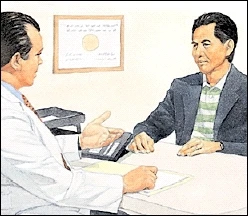It’s likely that hepatitis C virus (HCV) was found when routine liver tests were done on your blood or after you donated blood. Once hepatitis C is discovered, a medical evaluation helps assess if you have liver disease. You may also have a small sample (biopsy) taken from the liver to see if medications may help.
Remember: No vaccine or medication can prevent the spread of HCV and hepatitis C. It's up to you to keep others safe.

Take These Steps
To help keep your body strong and possibly relieve symptoms:
- Avoid stressing the liver. Do not use alcohol and any unnecessary medications-even over-the-counter medications such as acetaminophen. These can stress the liver.
- Eat a balanced diet. A diet low in fat, high in fiber, and full of fresh fruits and vegetables helps you maintain your health.
- Take prescribed medications. To help your liver work better, you may be given injections of a medication called alpha interferon 3 times a week for 6-12 months. In most cases, you will also be given ribavirin (an antiviral medication) to take orally 2 times a day. Your doctor can talk to you about the possible side effects of therapy with these medications.

Follow Up Regularly
Hepatitis C can get worse and damage your liver without your knowing it. Stay in regular contact with your doctor and health care team. They can watch your condition and tell you about any new research and types of treatment for hepatitis C.
